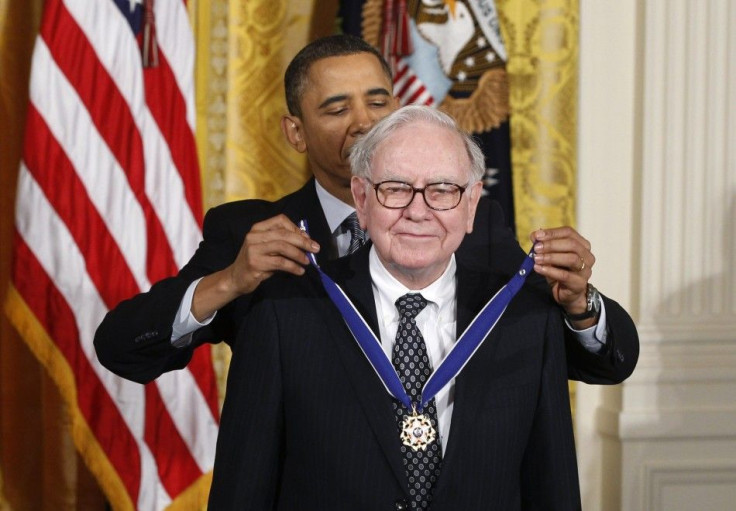Obama Tax Plan ‘Buffett Rule’ Backed by 63% of Global Investors

Can Congress increase the income tax on the wealthy? It can if the latest Bloomberg Poll is any indicator -- global investors overwhelming support President Barack Obama's proposed tax increase on adults with adjusted gross incomes of $1 million or more annually.
In the poll, 63 percent of those 1,031 global investors polled by Bloomberg News on Sept. 26 approved of President Obama's proposal, know as the Buffett Rule after Berkshire Hathaway (BRK.A) Chairman Warren Buffett. Buffett said it's wrong for society to require him to pay a smaller share of his income in taxes than his secretary does.
Among U.S. investors, support for the tax hike on the wealthy was lower, with only 40 percent favoring it.
Support for the tax hike was highest in Europe, where French President Nicholas Sarkozy is also planning a 3 percent tax surcharge on incomes above €500,000 or $680,000. Europeans favored Obama's upper income tax 78 percent to 17 percent against. In Asia, the spread was 69 percent to 21 percent.
Shared Sacrifice or Over-Taxation?
President Obama argues that under shared sacrifice, if the middle class and working class are going to be called to sacrifice benefits via changes to Social Security and Medicare and cuts in other programs to achieve a balanced budget, then upper-income Americans and the wealthy should be called to sacrifice, as well, in the form of an income tax increase. Obama said it was just the right thing to do.
Congressional Republicans argue that taxes are already high enough on the wealthy -- and that upper-income groups already pay a disproportionate share of federal taxes. The GOP also argues that raising taxes will reduce business investment and discourage initiative.
Congressional Democrats argue that upper-income groups have had it too easy for too long. In addition to devastating the United States' fiscal condition -- the 2001 Bush income tax cut instantaneous turned a roughly $100 billion surplus under then President Bill Clinton into a deficit under President George W. Bush -- most of the income and wealth from 2001 through 2008 flowed to upper-income groups -- putting them in a much better position to return to the pre-Bush income tax rates.
Congressional Republicans immediately branded the White House's deficit reduction program as class warfare. Obama rejected that thesis, out-of-hand.
This is not class warfare, it's math, Obama said.
Loop-Hole Cuts Hedge Fund, Investment Fund Taxes
Liberal and populist groups generally favor Obama's proposal because of what they argue is a flaw in U.S. tax law. Although in theory upper income groups pay a higher percent of their income in federal tax, after subtracting for deductions, credits, and other breaks, upper-income adults -- and especially the uber-rich with adjusted gross incomes above $5 million per year -- often pay a lower percent of their income in federal income tax than middle-income and working class adults.
In other words, Obama is going after one of the biggest loop holes in the current tax law -- and one that costs the U.S. Government hundreds of billions of dollars -- the 20 percent differential that encourages tax filers to find ways to reclassify wage income as investment income.
That loop hole in federal tax law is one reason that hedge fund managers, for example, among other institutional investors and accredited investors, who gross over $10 million of $25 million per year can, via reclassification, shift wage/salary income to investment income --- often resulting in a lower effective tax rate than middle-income and working-class filers.
Those who have done well, including me, should pay our fair share, Obama said, guardian.co.uk reported. I reject the idea that asking a hedge fund manager to pay the same tax rate as a plumber or teacher is class warfare.
The Bloomberg News Poll of Bloomberg Professional service subscribers has a margin of error of plus or minus 3.1 percentage points.
Political/Public Policy Analysis: A higher tax on upper-income Americans and the uber-rich is long overdo.
More than $10 trillion in wealth has been added to upper-income groups' portfolios since 2001 -- a massive increase in wealth -- while median incomes have been essentially flat, with some job segments seeing real income declines in the past 10 years.
That said, the political calculus for the Obama deficit reduction plan is not good. Simply, Republicans effectively control one-half of the U.S. Government: they are in the majority in the House and they have filibuster power in the Senate.
As a result, the tax increase -- even a modest tax increase -- is not likely to be passed before January 2013. Rather, the GOP will simply try to run out the clock -- take no substantive action on key issues through November 2012, hoping they can defeat Obama/win the presidency and increase their seats in Congress. In other words, for all intents and purposes, Washington is already in campaign mode.
The only caveat to the above is if an overwhelming majority of Americans speak as one voice and place pressure on House and Senate Republicans to raise income taxes on the wealthy. Right now, that doesn't look too likely, as most Americans are concerned about job growth and unemployment. Americans foremost want Congress to enact policies that create jobs and reduce the nation's very high 9.1 percent unemployment rate: unemployed Americans want work, and most Americans who are employed are concerned about their own job security. Given the current political climate, changes to the tax code most likely will have to wait until after the November 2012 election.
© Copyright IBTimes 2025. All rights reserved.




















